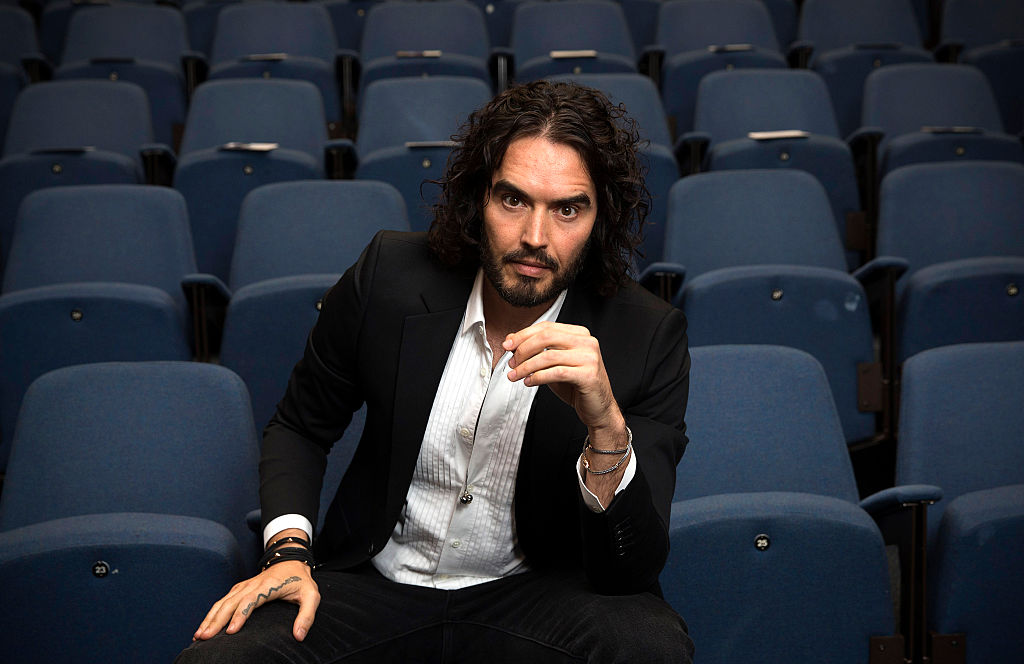Russell Brand’s hero status among a prominent section of the British left began on Friday 13 September 2013 and officially came to an end one week ago. On both occasions the medium was the Guardian.
The 2013 moment came when he wrote for the paper giving ‘his side of the story’ after being kicked out of a GQ awards event for making a joke about the Hugo Boss fashion label and its historic links with the Nazis. Just shy of ten years later, the paper’s columnist George Monbiot last week published a mea culpa for having once been an advocate for Brand. He had nominated the comedian as his ‘hero’ of 2014, saying he was ‘the best thing that has happened to the left in years’.
That was typical of Brand’s status in that quarter in the years following that column: he did celebrity cameos for Alan Rusbridger in Guardian news conferences, wrote further columns, guest-edited the New Statesman and was invited on to Newsnight – twice. Owen Jones suggested that Brand’s backing might help swing the 2015 general election Ed Milband’s way. Even the usually reliably combative Jeremy Paxman seemed smitten, lapsing into Brandspeak to ask him why he ‘couldn’t be arsed to vote’.
But in denouncing Brand last week, Monbiot was articulating a wider disenchantment among many of these one-time fans. The man they once saw as a potential saviour has instead become a prominent conspiracy theorist spouting all manner of often dangerous nonsense to his millions of YouTube followers, an unpalatable UK equivalent of Joe Rogan – with whom he regularly consorts. No wonder Monbiot is embarrassed. But how could he and his colleagues have fallen for him in the first place?
The man they once saw as a potential saviour has instead become a prominent conspiracy theorist, spouting all manner of often dangerous nonsense to his millions of YouTube followers
Brand’s back-story when the Guardian first took him up was that he’d been an MTV presenter, become drug-addicted but was now clean and doing comedy. What he didn’t say and they didn’t notice – but was glaringly obvious all along – was that he had replaced the quest for the next chemical high with a craving for attention.
That Guardian column, promoted over a sizeable chunk of the front page, had a characteristically overdone intro predicated around a scuba dive which was, Brand wrote, ‘nuministic enough, a drenched heaven; coastal shelves and their staggering, sub-aquatic architecture, like spilt cathedrals, gormless, ghostly fish gliding by like Jackson Pollock’s pets’. The florid prose camouflaged the real point. ‘I’m not saying I’m an estuary Che Guevara,’ he wrote many paragraphs later. But this very much was what he was saying, how he was styling himself – and how he was seen.
Aiming to move beyond the confines of MTV into wider fame, Brand was beginning to posture as an intellectual. That scuba passage, for example, includes references to art, architecture, religion and a word, nuministic, that no one has heard of – all in a single sentence. His literary output quickly transitioned from the puerile, My Booky Wook, to the loftier Revolution.
But beyond the rebel prose, Brand was closer in his thinking to Groucho than Karl Marx: ‘Those are my principles, and if you don’t like them… I have others’ was his ultimate creed. He told Paxman in 2014: ‘I’ve never voted and I never will.’ The following year he was urging the youth to vote Labour.
And the former Sun ‘shagger of the year’, who had caused a national scandal by bragging to Andrew Sachs about sleeping with his granddaughter, was suddenly positioning himself as feminist. He was talking about the evils of inequality while cohabiting with an heiress, Jemima Khan, and hanging out in VIP areas with millionaire rockstars.
He purported to be transgressive, in the vein of Lenny Bruce, claiming to have once pleasured a man in a pub toilet while filming it, and offering to kiss Peter Hitchens during a debate on drugs. Then he married bubblegum-pop princess Katy Perry.
Then there was the cod mysticism, and soon, instead of aping Guevara, he had moved on to pretending to be Jesus. Brand didn’t want to just be a political guru, but a spiritual one too. This journey of the mind was symbolised by the rapid re-Branding of his Revolution as Re-love-ution. In redefining the terms of his own rebellion he was managing in months what took Mao two decades – though admittedly fewer people died.
And far from being a new twist, the penchant for conspiracy theories was there in plain sight too: in his second appearance on Newsnight with Evan Davis he said he was ‘open minded’ about whether 9/11 had been faked by the CIA. But by then too many people had bought into him for this to derail him: this attention-seeker had found his credulous audience.
They thought they saw in Brand someone who could promote their ideas about how to transform society and, in Monbiot’s case, the environment, to a young audience which would bring them into being. They took this one-time Big Brother presenter and tried to make him the new George Orwell.
But, like all attention-seekers, Brand got bored quickly and before he could save the world he had moved on – to full-time conspiracy theorist. Brand, Monbiot concluded last week, ‘has become the opposite of what he was’.
The signs that Brand was a shyster were there all along, though. And they weren’t subtle: this cos-play Che wasn’t deluding Monbiot and co. They were deluding themselves. Russell Brand was never the new messiah, he was just a very silly boy.






Comments